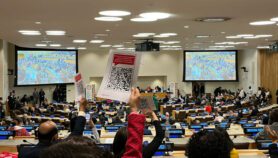By: Wagdy Sawahel
Send to a friend
The details you provide on this page will not be used to send unsolicited email, and will not be sold to a 3rd party. See privacy policy.
An anti-cancer agent could be used as a new drug against African sleeping sickness, according to researchers.
African sleeping sickness is caused by the parasite Trypanosome brucei, which is transmitted into the bloodstream by the bite of the tsetse fly. It kills approximately 50,000 people in sub-Saharan Africa every year, according to the World Health Organization (WHO).
There are currently two drugs available to treat infection, but both have limited use. DFMO is only effective against one of the two subspecies of parasite that cause the illness. Drug resistance is also emerging against Melarsoprol, the only drug that can be used to treat infections by both subspecies. Both drugs must be infused directly into the bloodstream and Melarsoprol has limited use due to its toxicity.
Artur Fijolek, from the Umeå University in Sweden, and colleagues showed that infected mice injected daily with the anti-cancer drug acivicin remained free of symptoms for at least one month. Untreated mice died within a few days.
The researchers say acivicin suppresses infection by inhibiting the production of an enzyme, CTP synthase, essential for the survival of the parasite.
Laboratory experiments ― using T. brucei cultured from blood ― also showed that acivicin kills the parasite when present at low concentrations for at least four days.
The researchers indicated that if acivicin kills the parasites when in the body, it could meet the criteria for a drug with ‘desirable’ properties ― able to cure within seven days ― as defined by the WHO and Drugs for Neglected Diseases Initiative.
According to Fijolek, the drug can kill both forms of T. brucei and is taken orally, which would reduce the cost of treatment in developing countries.
In addition, because the way the drug works is already known, and tests to check for toxicity in human patients have already been carried out, the amount of time before acivicin could be introduced as a treatment would be reduced.
Els Torreele, project manager at the Drugs for Neglected Diseases Initiative based in Switzerland, welcomed the research, saying the findings are of great interest and may open new avenues of drug treatment for African sleeping sickness.
But she warned that there is still more work to be done before acivicin can be considered as a candidate drug.
"It remains to be shown whether the anti-cancer agent acivicin has an appropriate efficacy and safety profile to compete with the current treatment options."
The study was published last month (20 April) in the Journal of Biological Chemistry.
Link to abstract in the Journal of Biological Chemistry
Reference: Journal of Biological Chemistry 282, 11858 (2007)













